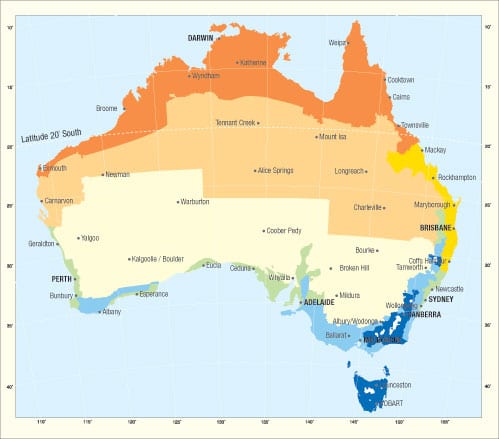As Prime Minister Tony Abbott continues his campaign to wind back climate change policies and institutions, a new report has highlighted how Australia has suffered the most dramatic increase in climate vulnerability of any G20 country in the past two years.
The assessment by climate change analysts at investment bank HSBC – released ahead of the IPCC report later this week – says Australia has recorded the biggest increase in temperatures of any G20 country, the second worst deterioration in water availability, and has the second higher cost per GDP from extreme weather events.
Australia’s ranking among G20 nations most vulnerable to climate change has plunged 5 places from 10th to 5th in the last two years, leapfrogging Indonesia, China, Mexico, Italy and South Korea
The top three countries exposed to temperature changes, water stress and extreme events remain Saudi Arabia, India and South Africa.
But Australia’s position has dramatically worsened since 2011 because it has recorded the biggest difference in temperatures among G20 nations, and the second worst deterioration in water availability behind the Saudis.
On another measure, sensitivity to climate change, Australia also ranks badly, second behind China.
Climate sensitivity means the degree to which a country can be affected by an extreme weather event both in humanitarian and in economic terms. Three criteria are measured: the number of deaths from weather events; the cost of the event in terms of GDP; and the number of people affected.
HSBC said that Australia pays the second highest cost per GDP (0.24 per cent) on extreme weather events, behind only China. And its overall sensitivity had worsened two places. In 2011, the Indian, Chinese and Russian economies were deemed to be the most sensitive to climate change. Now the top three three are China, Australia and Russia.
The one positive assessment for Australia came in HSBC’s assessment of the ability of each country to adapt to changes. Because of Australia’s strong economy, its low debt, its strong rule of law, lack of corruption and levels of tertiary education, Australia is considered to have the best capacity to adapt to these changes – ahead of other rich nations Canada, US and the UK.
HSBC said that a country with higher GDP and lower debt levels would be able to channel more available capital towards climate adaptation and “climate proofing” their country. “Where the “rule of law is strong, and corruption tends to be lower, and a higher rate of further education is in place, the potential for making positive behavioural changes among the general population is higher,” it notes.
That meant that on its assessment of overall vulnerability to climate change, Australia ranks as the14h most exposed country, slipping just one place. In effect, it has the resources to buy or build its way out of the worst impacts.
The country’s with the least ability to adapt are its neighbour to the north, Indonesia, and China and India. These three countries remained the most vulnerable to climate change on the overall score.
“In terms of absolute vulnerability, our analysis shows that countries are becoming marginally more exposed to climate change: temperatures continue to rise, water resources are being depleted and extreme events are occurring,” HSBC writes.
“In our view, evaluating country vulnerabilities to the climate factor is a critical tool for risk management, informing both asset allocation and the understanding of pressures along global value chains.”










